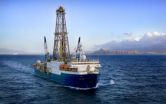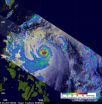(Press-News.org) Thirty-eight million years ago, tropical jungles thrived in what are now the cornfields of the American Midwest and furry marsupials wandered temperate forests in what is now the frozen Antarctic.
The temperature differences of that era, known as the late Eocene, between the equator and Antarctica were half what they are today.
A debate has been ongoing in the scientific community about what changes in our global climate system led to such a major shift from the more tropical, greenhouse climate of the Eocene to modern and much cooler climates.
New research results published in this week's issue of the journal Science, led by Rensselaer Polytechnic Institute scientist Miriam Katz, are providing some of the strongest evidence to date that the Antarctic Circumpolar Current (ACC) played a key role in the shift.
"What we have found is that the evolution of the Antarctic Circumpolar Current influenced global ocean circulation much earlier than previous studies have shown," said Katz. "This finding is particularly significant because it places the impact of initial shallow ACC circulation in the same interval when the climate began its long-term shift to cooler temperatures."
There has been a debate over the past 40 years on what role the Antarctic Circumpolar Current had in the past cooling trend.
"These climate changes are one of the most significant shifts in Earth's history, from early Cenozoic 'greenhouse' climates to the mid- to late Cenozoic 'icehouse' that saw repeated massive glaciations of the polar regions," said Candace Major, program director in the National Science Foundation's (NSF) Division of Ocean Sciences.
The research was funded by NSF in partnership with the Integrated Ocean Drilling Program, and its predecessor programs, the Ocean Drilling Program and Deep Sea Drilling Project.
"The work by Katz and colleagues is the first to demonstrate that the basic structure of currents associated with modern ocean circulation has existed for the past 33 million years," said Major.
Previous research had placed the development of the deep ACC--greater than 2,000 meters water depth--in the late Oligocene, approximately 23-25 million years ago.
That's well after the global cooling pattern had been established.
Katz and colleagues have placed the global impact of the ACC at approximately 30 million years ago, when it was still just a shallow current.
Oceans and global temperatures are closely linked. Warmer ocean waters result in warmer air temperatures and vice versa.
In the more tropical environs of the Eocene, ocean circulation was weaker and currents more diffuse.
As a result, heat was more evenly distributed around the world. That resulted in fairly mild ocean temperatures worldwide.
Today, ocean temperatures vary considerably and redistribute warm and cold water around the globe.
"As the global ocean currents were formed and strengthened, the redistribution of heat likely played a significant role in the overall cooling of the Earth," Katz said.
No current is more major than the ACC, scientists believe.
Often referred to as the "mixmaster" of the ocean, the ACC thermally isolates Antarctica by preventing the warm surface waters of subtropical gyres from passing through.
The ACC instead redirects some of that warm water back toward the north Atlantic, creating Antarctic Intermediate Water.
This blocking of heat enabled the formation and preservation of the Antarctic ice sheets, according to Katz.
The circumpolar circulation, Katz concludes, was responsible for the development of the modern four-layer ocean current and heat distribution system.
Katz looked at the uptake of several elements' isotopes, or variants, in the fossil skeletons of small planktonic organisms found in ocean sediments.
Using the drillship, the fossil organisms, known as benthic foraminifera, were brought up from beneath the sea-floor in long cores of sediments.
The foraminifera incorporated certain elements and isotopes, reflecting environmental conditions at the time.
By analyzing the ratios of these elements and isotopes, researchers were able to reconstruct past environmental conditions. They looked at isotopes of oxygen and carbon, along with ratios of magnesium versus calcium.
Analysis of these isotopes showed the earliest evidence for Antarctic Intermediate Waters, which circulates as a consequence of the ACC.
This finding is the first evidence of the effects of shallow ACC formation.
The results place the ACC's global impact much closer to the time when Antarctica separated from South America, creating a gateway.
It had previously been thought that currents moving through this gateway could not be strong enough at such shallow depths to affect global ocean circulation.
"By reconstructing the climates of the past, we can explore Earth system responses to current climate change," Katz said.
INFORMATION:
Katz is joined in the research by Benjamin Cramer of Theiss Research; J.R. Toggweiler of Geophysical Fluid Dynamics Lab/NOAA; Chengjie Liu of Exxon Mobil Exploration Co.; Bridget Wade of University of Leeds; and Gar Esmay, Kenneth Miller, Yair Rosenthal, and James Wright of Rutgers University.
Significant role of oceans in onset of ancient global cooling
Evidence that early Antarctic Circumpolar Current development affected global climate
2011-05-27
ELSE PRESS RELEASES FROM THIS DATE:
Research study by UM Frost School of Music to be presented in Norway at prestigious conference
2011-05-27
CORAL GABLES, FL (May 26, 2011) A new research study conducted by University of Miami Frost School of Music's Music Engineering Technology Group touches upon multi-touch surfaces as emerging valuable tools for collaboration, display, interaction, and musical expression. The study will be presented at the 2011 International Conference on New Instruments for Musical Expression in Oslo, Norway this month.
A Low-Cost, Low-Latency Multi-Touch Table with Haptic Feedback for Musical Applications, authored by Matthew Montag GMuE '11 (Cedar Rapids, IA), Stefan Sullivan GMuE '12 ...
Anti-Static Screen Cleaner Released for Flatscreen TVs
2011-05-27
There are several cleaning products for flatscreen televisions and then there are anti-static screen cleaners. Now, even the retailers who sell you televisions will tell you that you would do best to buy an anti-static screen cleaner for flatscreen TVs because they are what will ensure long-term protection for your device. Here we shall see the benefits of using such a cleaning product over other cleaners.
The anti-static technology was patented by Reckitt Benckiser. These are the people who had developed the very popular Brasso cleaning product, which has become almost ...
World-wide assessment determines differences in cultures
2011-05-27
Conflicts and misunderstandings frequently arise between individuals from different cultures. But what makes cultures different; what makes one more restrictive and another less so?
A new international study led by the University of Maryland and supported by the National Science Foundation's Division of Behavioral and Cognitive Sciences offers insights that may help explain such cultural differences and bridge the gaps between them.
Published in the May 27 issue of the journal Science, the study for the first time assesses the degree to which countries are restrictive ...
NASA: Songda becomes a super typhoon
2011-05-27
As predicted, Typhoon Songda intensified and was a super typhoon with wind speeds estimated at over 130 knots ( ~145 mph) when NASA's TRMM satellite passed directly over head on May 26, 2011 at 0806 UTC (4:06 a.m. EDT).
The Tropical Rainfall Measuring Mission (TRMM) satellite captured the heavy rainfall rates within the super typhoon using TRMM's Visible and InfraRed Scanner (VIRS) instrument. The rainfall analysis from TRMM's Microwave Imager (TMI) and Precipitation Radar (PR) data showed that Songda had a circular eye with extremely heavy rainfall (as much as 2 inches/50 ...
NASA is making hot, way cool
2011-05-27
The more advanced the electronics, the more power they use. The more power they use, the hotter they get. The hotter they get, the more likely they'll overheat. It doesn't take a rocket scientist to understand what typically happens next: The electronics fry.
In the world of electronics, thermal control is always one of the limiting factors -- particularly in space where there is no air to help cool down electronic components.
However, Jeffrey Didion, a thermal engineer at the NASA Goddard Space Flight Center in Greenbelt, Md., and Dr. Jamal Seyed-Yagoobi, a professor ...
1-800-GET -THIN (SM) is a Proud Supporter of Breast Cancer Awareness
2011-05-27
On October 18, 2010, 1-800-GET-THIN announced that they had joined forces with the Lifetime Network throughout the month of October, teaming up in support of Breast Cancer Awareness. The ultimate goal of the Breast Cancer Awareness campaign is to emphasize the importance of self-examinations as well as professional breast examinations and encourage them to be proactive with their health care.
It is also important for women to be educated and aware of the signs and symptoms that could indicate a health problem. When cancer is detected earlier, there may be a better chance ...
The use of placebo in rheumatoid arthritis clinical trials may negatively impact patients
2011-05-27
The results of this study, conducted in Germany, re-open the debate on whether it is ethical to conduct placebo-controlled studies where patients in the placebo-group are at a serious disadvantage compared to patients taking the new treatments. The study analysed current study designs, for new therapies such as abatacept (Orencia®), golimumab (Simponi®) or tocilizumab (Actemra®), and showed that patients in the placebo group experienced no change in medication, having to continue with their former, ineffective treatment plus placebo.
"According to the Helsinki-Declaration ...
Arthritis patients taking newer treatments do not have an overall increased cancer risk
2011-05-27
Only three percent (n=181) of patients in the study cohort receiving anti-tumour necrosis factor agents (anti-TNFs) for treatment of their arthritis developed a first cancer within nine years and overall risk was not dependent on the type of arthritis.
The nine year follow-up study conducted at Gentofte University Hospital, Denmark demonstrated that relative risk ((RR)=1.03 (95%confidence interval 0.82-1.30)) was not increased in patients treated with anti-TNFs compared to patients who had never taken anti-TNFs during 23,965 person-years follow-up. Overall cancer risk ...
Undertreatment of cardiovascular disease in rheumatoid arthritis patients following a heart attack
2011-05-27
Results of a study, involving 98,454 patients demonstrated that at 30 days following their first heart attack, RA patients were approximately 20% less likely to be prescribed standard MI treatments, such as statins and betablockers, compared to healthy patients. These finding remained relatively unchanged at 180 days, further highlighting differences between the two groups, with a high number being prescribed the current standards of care within the 180 day period (statins 80%, betablockers 82%, clopidogrel 70%, aspirin 79%) in general.
"Previous research has established ...
Study reveals that financial conflicts of interest are associated with positive study outcomes
2011-05-27
Results demonstrate that 91% of RCTs recording this kind of FCOI achieved a positive - outcome, compared to 66.7% of RCTs without specific FCOI (p=0.02) and adjusting for confounding factors did not change this finding.
Results of this American study demonstrate that between the two periods 2002-3 and 2006-7 there was a significant increase in the number of RA RCTs listing lead authors as receiving consulting fees/honoraria (14.6% in the first time period compared to 40% in the second (p=0.004)). FCOIs including research grants, employment by sponsoring pharmaceutical ...
LAST 30 PRESS RELEASES:
New knowledge on heritability paves the way for better treatment of people with chronic inflammatory bowel disease
Under the Lens: Microbiologists Nicola Holden and Gil Domingue weigh in on the raw milk debate
Science reveals why you can’t resist a snack – even when you’re full
Kidney cancer study finds belzutifan plus pembrolizumab post-surgery helps patients at high risk for relapse stay cancer-free longer
Alkali cation effects in electrochemical carbon dioxide reduction
Test platforms for charging wireless cars now fit on a bench
$3 million NIH grant funds national study of Medicare Advantage’s benefit expansion into social supports
Amplified Sciences achieves CAP accreditation for cutting-edge diagnostic lab
Fred Hutch announces 12 recipients of the annual Harold M. Weintraub Graduate Student Award
Native forest litter helps rebuild soil life in post-mining landscapes
Mountain soils in arid regions may emit more greenhouse gas as climate shifts, new study finds
Pairing biochar with other soil amendments could unlock stronger gains in soil health
Why do we get a skip in our step when we’re happy? Thank dopamine
UC Irvine scientists uncover cellular mechanism behind muscle repair
Platform to map living brain noninvasively takes next big step
Stress-testing the Cascadia Subduction Zone reveals variability that could impact how earthquakes spread
We may be underestimating the true carbon cost of northern wildfires
Blood test predicts which bladder cancer patients may safely skip surgery
Kennesaw State's Vijay Anand honored as National Academy of Inventors Senior Member
Recovery from whaling reveals the role of age in Humpback reproduction
Can the canny tick help prevent disease like MS and cancer?
Newcomer children show lower rates of emergency department use for non‑urgent conditions, study finds
Cognitive and neuropsychiatric function in former American football players
From trash to climate tech: rubber gloves find new life as carbon capturers materials
A step towards needed treatments for hantaviruses in new molecular map
Boys are more motivated, while girls are more compassionate?
Study identifies opposing roles for IL6 and IL6R in long-term mortality
AI accurately spots medical disorder from privacy-conscious hand images
Transient Pauli blocking for broadband ultrafast optical switching
Political polarization can spur CO2 emissions, stymie climate action
[Press-News.org] Significant role of oceans in onset of ancient global coolingEvidence that early Antarctic Circumpolar Current development affected global climate




